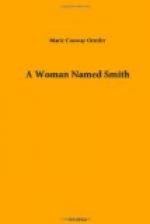“I lost the paper in the attic the night you heard me stumble on the stairs. Fortunately, The Author put it in his coat in the closet and locked the door on the outside. You can enter any room in the Hynds House through those closet-walls, Sophy. They’re paneled, remember. I hated to have to go through The Author’s pockets like a burglar, but I had to have the key.”
He handed me the flash-light.
“Now for the column of dots, each of which represents a brick,” he said, and began to count, from the first dark brick immediately under the center of the triangle. At the third brick he paused; I could see his fingers moving around the white line that, apparently, held it in place. And that third brick, which looked so solidly placed, turned as upon a pivot and swung out sideways. Still counting from top to bottom, he paused at the fifth, the seventh, and the ninth, and they, too, behaved in the same manner. As the ninth one turned, that which had seemed a section of solid wall rose soundlessly from the floor and left in its place an opening, a door, as it were, some six feet high and about eighteen inches wide.
“It is not brick at all, but painted wood. A really wonderful bit of work,” explained Mr. Jelnik.
I could only stare, owlishly.
“You are wondering where we are?” He answered the unspoken question: “Above the library, between the outside wall and the chimney-stacks. You’d have to tear the house down to find it, without the Key.” As he spoke, he was lighting two of the candles Achmet had provided us with, and although his hand was quite steady, he had become frightfully pale. I, too, felt myself growing paler, felt again the cold grue, as if the wind of death had stirred my hair.
“Reach into my breast pocket and you’ll find a small vial. Put a drop of the contents on your handkerchief and hold it against your mouth for a moment,” said Mr. Jelnik, with a sharp glance at me.
I obeyed mechanically. The scent had an indescribably tingling, spicy odor, and left a cool and grateful sensation in one’s parched and dry throat. My blurred vision cleared, my dull and throbbing head was relieved.
“An Alexandrine Copt gave me that,” he said, watching its effect with satisfaction. “He told me he had gotten it from a temple papyrus, and that it was undoubtedly one of the lost perfumes of Punt, used by the higher priesthood in their mysteries. Once a year he sends me such a tiny vial as you see. I could hardly have survived my searchings in this house, without that saving perfume. Do you feel able to go on?”
“Yes.”
“Come, then,” and with that he stepped through the opening, and I after him.
The room was not large—perhaps some nine feet high, some eight feet wide. The walls were of such exquisitely grooved and polished red mahogany that the candle-light was reflected in them as in mirrors; one seemed to be surrounded by twinkling red stars. On each side of the opening stood a tall and narrow cabinet, somewhat like a high-boy, and in one corner was a chest with iron clasps and handles. Over in another corner was a heavy, medium-sized square table, on which stood a blackened candelabrum and a tarnished silver-gilt cup. There were two chairs drawn up to this table. On one of them, fallen forward, was something.




